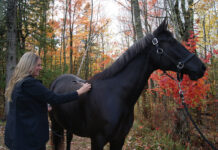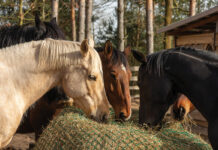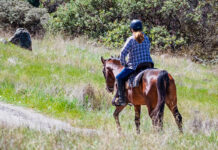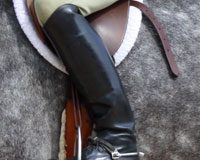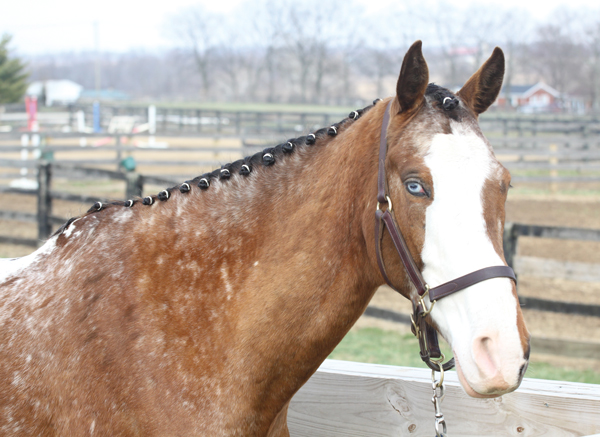
Style your pony’s mane for English with rubber band braids or western competition with mane banding.
Rubber Band Braids
◆ Braiding rubber bands that match your horse’s mane (white was used here so they were easier to see)
◆ Metal pulling comb
◆ Hair clip
◆ Braiding spray or hairspray
 Braiding your horse’s mane is easy to learn with this technique using rubber bands. All it takes is a bit of practice! These braids aren’t appropriate for A-circuit hunters (you’ll still need lots of tiny yarn braids there), but should be perfectly fine for schooling shows, jumpers, eventing and dressage competitions.
Braiding your horse’s mane is easy to learn with this technique using rubber bands. All it takes is a bit of practice! These braids aren’t appropriate for A-circuit hunters (you’ll still need lots of tiny yarn braids there), but should be perfectly fine for schooling shows, jumpers, eventing and dressage competitions.
The first step is to prep your horse’s mane to the right length. If he will let you pull it, this thins out the hair nicely and makes braiding much easier. If he hates having his mane pulled, the good news is you can still do the braids, they’ll just be a lot bigger than what is shown here.
We don’t recommend cutting straight across with scissors to shorten a mane. This leaves a blunt and unnatural edge. Try a SoloComb, clipper blade or scissors turned vertically to shorten while keeping a natural edge if you’re not pulling.
Either way, get the mane to about 5 to 6 inches in length, and you’re ready to go!
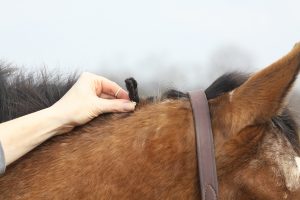
1. Starting at the top of the mane, measure a section about as wide across as four fingers. Clip the rest of the hair out of the way. Dampen the hair and braid tightly, pulling downward. Secure at the bottom with a rubber band. To pull the braid up, fold in half and use a second band to secure (shown).
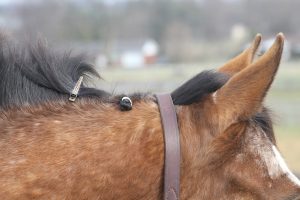
2. Fold in half one more time and finish off with a third band. Always keep braids pointed downward and pushed against the crest of the neck.

3. Continue braiding all the way down the neck, keeping the size of each braid the same.
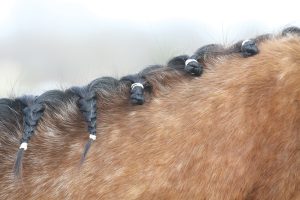
4. Pull up the braids one by one, folding in half and then folding again. Don’t forget to braid the forelock using the same method. Then you’re done and ready to show!
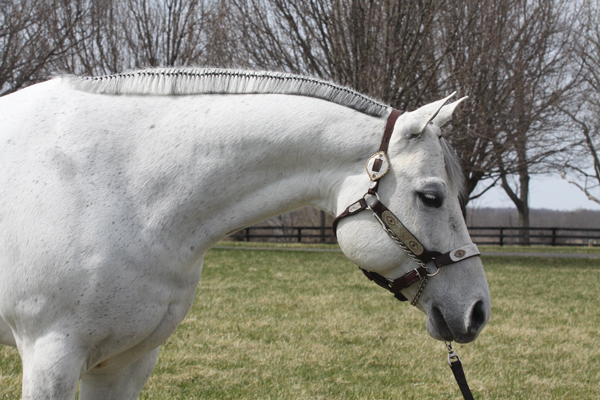
Banding the Mane
Materials:
◆ Black rubber braiding bands (these work on any color horse)
◆ Comb
◆ Scissors
◆ Hair clip
◆ Braiding spray or hairspray
Banding for the western show pen has the same purpose as braiding: to present a neat, tidy appearance in front of the judge and to show off your horse’s neck. As with braiding, practice, practice, practice makes perfect! Don’t just wing it the morning of your show.
Prep the mane by shortening it to about 4 or 5 inches long; you can always take more off later. Give it a deep clean with shampoo to remove any dirt, dust and dander at the roots. Don’t condition though, because you want to be able to get a good grip on the hair.
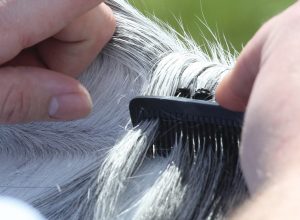
1. Spray hair with water or braiding spray and comb. Separate so that the same amount of hair is in each band for the best finished product. Make sure to section off using a comb so the mane is divided with straight lines.
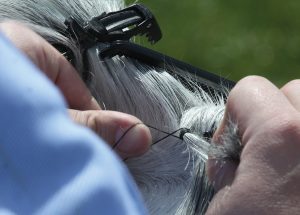
2. Hold the mane down and close to the neck, banding high up on the hair. Wrap the band with no overlap so it lies flat. Don’t wrap so tight that the hair “puckers.”
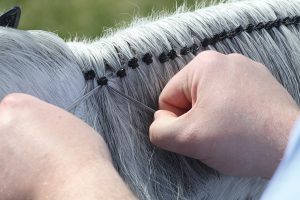
3. If any bands appear out of line at the end, pull out to either side while keeping the section against the neck to push the band up.
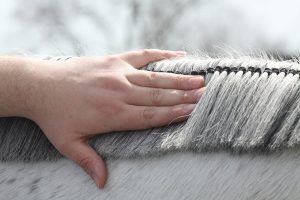
4. As a final step, press the hair down to measure the length and make sure it’s even. Cut straight across with scissors or thinning shears (for a more natural edge) if the length looks uneven.
You can tame the forelock with a bit of baby oil to keep it lying flat, or put a band it in as well. All done!
This article on English rubber band braids and western mane banding originally appeared in the July/August 2019 issue of Young Rider magazine. Click here to subscribe!

